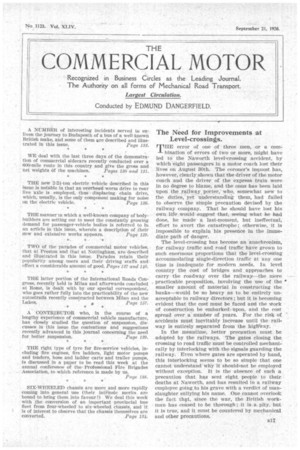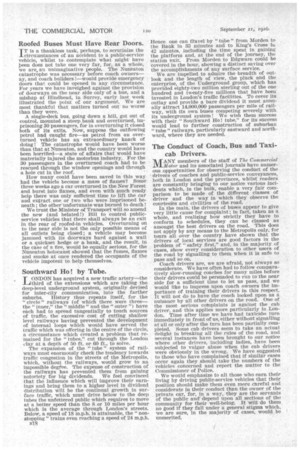The Need for Improvements at Level-crossings.
Page 35

Page 36

If you've noticed an error in this article please click here to report it so we can fix it.
THE error cif one of three men, or a combination of errors of two or more, might have led to the Naworth level-crossing accident, by which eight passengers in a motor coach lost their lives on August 30th. The coroner's inquest has, however, clearly shown that the driver of the motor coach and the driver of the express train were In no degree to blame, and the onus has been laid upon the railway, porter, who, somewhat new to the duties, yet understanding them, bad failed to observe the simple precaution devised by the railway company. That he should have lost his own life , Would" suggest that, seeing what he bad done, he made' a last-moment, but ineffectual, effort to avert the catastrophe ; otherwise, it is impossible to explain his presence in the immediate path of danger.
The level-crossing has become an anachronism, for railway traffic and road traffic have grown to such enormous proportions that the level-crossing accommodating single-direction traffic at'any one time is inadequate for modern needs. In level country the cost of bridges and approaches to carry the roadway over the railway—the more practicable proposition, involving the use of the smaller amount of material in constructing the banks—would be so heavy as to be entirely unacceptable to railway directors; but it is becoming evident that the cost must be faced and the work of cOnstruction be embarked upon, and the cost spread over a number of years. For the risk of accidents must inevitably increase until the railway is entirely separated from the higifway.
In the meantime, better precaution must be adopted by the railways. 'The gates closing the crossing to road traffic must be controlled mechanically by interlocking with the signals guarding the railway. Even where gates are operated by hand, this interlocking seems to be so simple that one cannot understand'why it shouldsnot be employed without exception. It is the absence of such a precaution that has sent eight people to their deaths at Naworth, and has resulted in a railway employee going to his grave with a verdict of manslaughter sullying his name. One cannot overlook the fact th4t, since the war, the British workman has ceased to be thorough ; it is a pity, but it is true, and it must be countered by mechanical and other precautions.
Roofed Buses Must Have Rear Doors.
TT is a thankless task, perhaps, to scrutinize the lcircumstances of an accident to a public-service vehicle, whilst to contemplate what might have peen does not take one very far, for, as a whole, we are, an unimaginative people. The Nuneaton catastrophe was necessary before coach owners— ay, and coach builders !—would provide emergency doors that could be opened in any circumstance. For years we have inveighed against the provision of doorways on the near side only of a bus, and a mishap at Hindhead, in Surrey, early last week illustrated the point of our argument. We are most thankful that matters turned out no worse than they were.
A single-deck bus, going down a hill, got out of control, mounted a steep bank and overturned, imprisoning 30 passengers, for in overturning it closed both of its exits. Now, suppose the outflowing petrol had caught fire—as petrol from an overturned vehicle has an extraordinary knack of doing 1 The catastrophe would have been worse than that at Nuneaton, and the country would have been horrified—a state of affairs that would have materially injured the motorbus industry. For the 30 passengers in the overturned coach had to be rescued through the window openings and through a hole cut in the roof.
How many could have been saved in this way had the vehicle become a mass of flames? Some three weeks ago a car overturned in the New Forest and burst into flames, and even with much ready help there was only sufficient time to lift the car and extract one or two who were imprisoned beneath; the other unfortunate was burned to death !
We truSt the Minister of Transport will so amend the new (and belated!) Bill to control publicservice vehicles that there shall always be an exit In the rear of roofed-in vehicles. Overturning on to the near side-is not the only possible means of all outlets being closed ; a vehicle may become jammed with its doorways hard against a wall or a quickset hedge or a bank, and the result, in the case of a fire, would be equally serious, for the Nuneaton holocaust showed that the fumes, flames and smoke at once rendered the occupants of the vehicle impotent to help themselves.
Southward Ho! by Tube.
TONDON has acquired a new traffic artery—the 4 third of the extensions which are taking the deep-level underground system, originally devised for inter-city communication, into the farther suburbs. History thus repeats Itself, for the " circle " railways (of which there were three— the "inner," the " middle " and the "outer ") have each had to spread tangentially to touch sources of traffic, the excessive cost of cutting shallow level railways having prevented the development of internal loops which would have served the traffic which was offering in the centre of the circle, a circumstance which created a problem that remained for the "tubes," cut through the London day at a depth of 50 ft. or 60 ft., to solve.
The expansion of the " tube" system of railways must enormously check the tendency towards traffic congestion in the streets of the Metropolis, which, without the railways, would grow to an impossible degPee. The expense of construction of the railways has prevented them from gaining notoriety for big dividends. We feel convinced that the influence which will improve their earnings and bring them to a higher level in dividend distribution will be the continual growth in surface traffic, which must drive below to the deep tubes the unfettered public which requires to move at a better speed than the 8 or 10 miles per hour which is the average through London's streets. Below, a speed of 18 m.p.h. is attainable, the " nonstopping " trains even reaching a speed of 24 m.p.h. 3318 Hence one can fiavel by " tube " from Morden to the Bank in 35 minutes and to King's Cross hi 42 minutes, including the time spent in gaining the platform and, at the end of the journey, the station exit. From Morden to Edgware could be covered in the hour, showing a distinct saving over the accomplishments of any surface service, We are impelled to admire the breadth of outlook and the length of view, the pluck and the enterprise, of the Underground group, which has provided eighty-two million sterling out of the one hundred and twenty-five millions that have been invested in London's traffic facilities. To cover its outlay and provide a bare dividend it must annually attract 14,000,000 passengers per mile of railway, with its own buses competing severely with its underground system ! We wish them success with their "Southward Ho! tube," for its success would lead to further construction of suburban " tube " railways, particularly eastward and northward, where they are needed.
The Conduct of Coach, Bus and Taxicab Drivers.
A/TANY members of the staff of The Commercial 1.V.I.Motor and its associated journals have numerous opportunities for observing the conduct of the drivers of coaches and public-service conveyances, both in London and the provinces, whilst readers are constantly bringing to our notice various incidents which, in the bulk, enable a very fair comparison to be made of the different classes of driver and the way in which they observe the courtesies and civilities of the road.
In the main, the drivers of buses appear to give very little cause for complaint ; in fact, taken as a whole, and realizing how strictly they have to conform to schedules, they can be classed as amongst the best drivers on the road. This does not apply by any means to the Metropolis only, for tours all over the country have shown that the drivers of local services are good factors in the problem of "safety first," and, in the majority of cases, show every consideration to other users of the road by signalling to them when it is safe to pass and so on. Coach drivers are, we are afraid, not always so considerate. We have often had to follow comparatively slow-running coaches for many miles before their drivers could be persuaded to run to the near side for a sufficient time to let us pass, and we would like to impress upon coach owners the importance of training their drivers in this respect. It will not do to have the coach looked upon as a nuisance by all other drivers on the road. One of the most serious complaints is against the cab driver, and this applies more particularly in London. Time after time we have had taxicabs turn immediately in front of us, either without signalling at all or only after the turn has been partially completed. Some cab drivers seem to take an actual delight in breaking all the rules of the road, and several instances have been brought to our notice where other drivers, including ladies, have been subjected to vulgar abuse when the cab drivers were obviously in the wrong. We have suggested to those who have complained that if similar cases occur again they should take the numbers of the vehicle's concerned and report the matter to the Commissioner of Police.
We would emphasize to all those who earn their living by driving public-service vehicles that their position should make them even more careful and considerate in their conduct than the owner of the private car, for, in a way, they are the servants of the public and depend upon all sections of the community for their well-being. It will do them no good if they fall under a general stigma which, we are sure, in the majority of cases, would be unmerited.




































































































